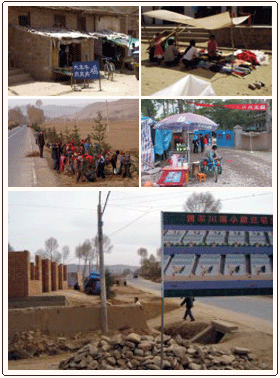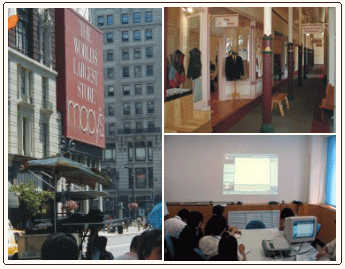The Fourth Step: Establishing an Internet Village
Once underdeveloped areas have improved their ability to create wealth, they must then alter their living conditions. Though the Internet Village is located in a remote rural village, it features state-of-the-art transportation and Internet access. It meets all the requirements of modern five-star hotel facilities. Its construction symbolizes the radical changes and advances that have taken place in the local region. It also serves as a contemporary business and recreational center for visitors from developed areas.
After the Internet Village becomes a reality, outside investors will flock to interact with local people. This  will work to fuel the introduction of outside knowledge and outside capital. It will unquestionably have a positive effect in sparking development of other industries. Other than the modern environment offered by the Internet Village, the knowledge, lifestyle, and values of outsiders would surely inspire locals to adjust their own viewpoints. In this way, a number of related industries will quickly emerge. Hence, the economy in areas surrounding the Internet Village will rapidly develop, absorbing villagers and encouraging them to relocate from nearby areas. A large workforce will then assemble at the Internet Village, providing the foundation for future development of a booming service industry. will work to fuel the introduction of outside knowledge and outside capital. It will unquestionably have a positive effect in sparking development of other industries. Other than the modern environment offered by the Internet Village, the knowledge, lifestyle, and values of outsiders would surely inspire locals to adjust their own viewpoints. In this way, a number of related industries will quickly emerge. Hence, the economy in areas surrounding the Internet Village will rapidly develop, absorbing villagers and encouraging them to relocate from nearby areas. A large workforce will then assemble at the Internet Village, providing the foundation for future development of a booming service industry.
The Fifth Step: Encouraging Relocation From Rural Settlements to Internet Villages
Concentrating population results in far more effective use of limited natural resources. Currently, more than half the population of impoverished areas lives in rural settlements. There are no decent roads, much less adequate Internet facilities. When villagers from these areas are persuaded to relocate to the Internet Village, the once inefficient farmland can return to its natural state. Furthermore, this will reduce the amount of needed infrastructure as well as streamline government bureaucracy. By relocating people from some 20,000 villages to concentrated Internet Villages, approximately 60% of these former agricultural and pastoral workers will now be freed to join the service industry. Thus, people living in the Internet Villages can enjoy the same variety of high-level services as those offered in large cities.
By holding East-West Connection activities, this will accelerate the rate of relocation to areas surrounding the Internet Villages. The local government will assist by encouraging mass relocation and investment. This is both the most important and challenging process to realize in overall efforts.
The Sixth Step Six: Developing the Service Industry
After becoming an Internet Village, the surrounding region's economy will quickly develop. Furthermore, once scattered villagers are concentrated near the Internet Village, there will be rapid growth of the local service industry. Exchange activities hosted by the Internet Village will continuously raise the level and quality of service. This process will attract multinational franchises to the area, which will also be beneficial to service industry development. By that time, the living conditions in the Internet Village will be virtually identical to conditions in Western Europe, America, Japan, and other developed areas. People living in the Internet Village need never fear being forced to relocate to other places in order to enjoy a high-quality life. They can enjoy an equally comfortable living right in their own hometowns.
The Seventh Step: Remote Empolyment and Service
 Once the Internet Village offers a standard of living equal to large developed cities, quality of living conditions becomes the deciding factor in selecting a home. Teams in distant locations will work together under the current system? of long-distance Internet management. Residents of the Internet Village may also take advantage of remote employment to resolve the issue of living standards. This will permit the majority of skilled villagers to remain rooted in their ancestral hometowns, creating wealth in their own regions. Such as in the United States, Western Europe and Japan, the Internet Village will return the region to a more natural environment, ideally suiting the needs of the middle and upper-class. Once the Internet Village offers a standard of living equal to large developed cities, quality of living conditions becomes the deciding factor in selecting a home. Teams in distant locations will work together under the current system? of long-distance Internet management. Residents of the Internet Village may also take advantage of remote employment to resolve the issue of living standards. This will permit the majority of skilled villagers to remain rooted in their ancestral hometowns, creating wealth in their own regions. Such as in the United States, Western Europe and Japan, the Internet Village will return the region to a more natural environment, ideally suiting the needs of the middle and upper-class.
The information society is the end product of instilling Internet resources in people's lives. By reaching this point, other than the geographical location of Internet Villages in rural areas, other aspects such as employment, medical care, shopping, and education can match and make use of resources in every corner of the world. Remote service operates as both the momentum pushing forward the information society economy and the means of protecting one's quality of life.
In conclusion: The information society of Internet Villages emerges directly from the agricultural society. Hence, its economy is still rooted in agricultural and pastoral industries. Though the lifestyle and standard of living matches that of other areas, there are distinct differences in people's treatment of the environment. They must increase protection and preservation of the environment. In regards to the 800 million Chinese farmers still engaged in agricultural or pastoral work, these seven steps represent a way out of a lifetime of grinding poverty. The Internet Village's information society will create a hometown beyond their most cherished dreams.
|